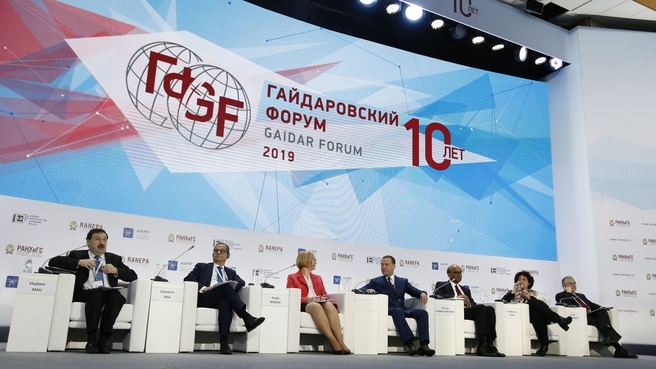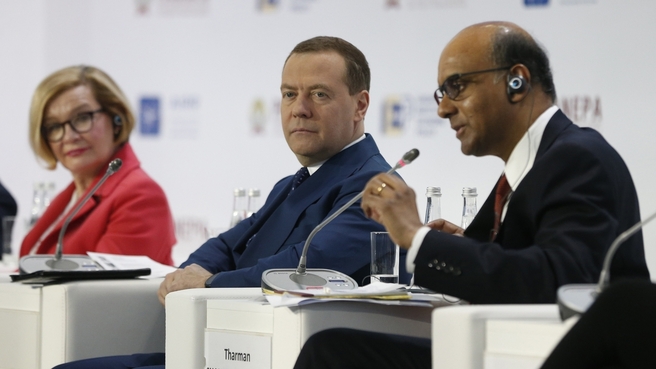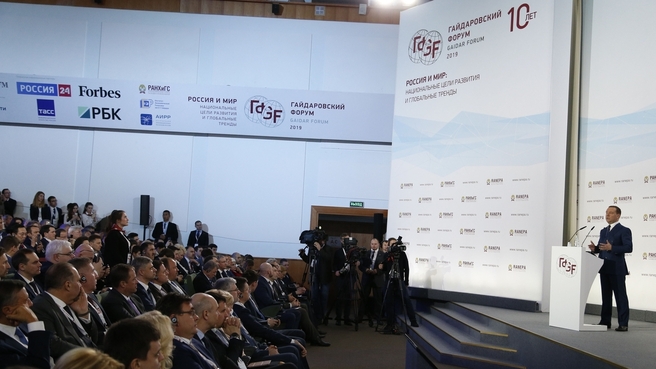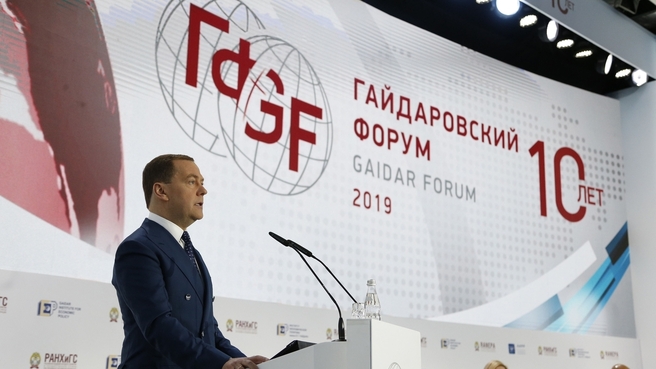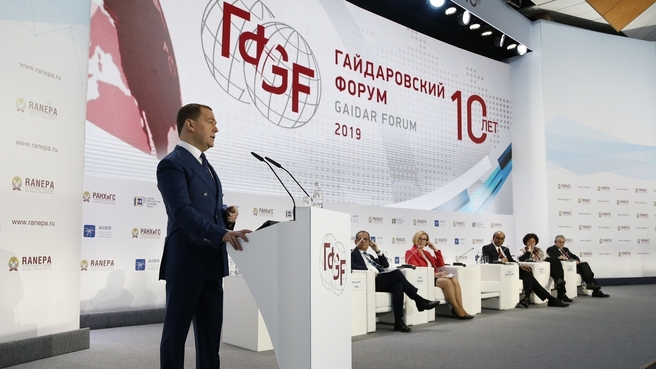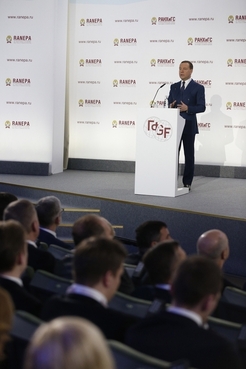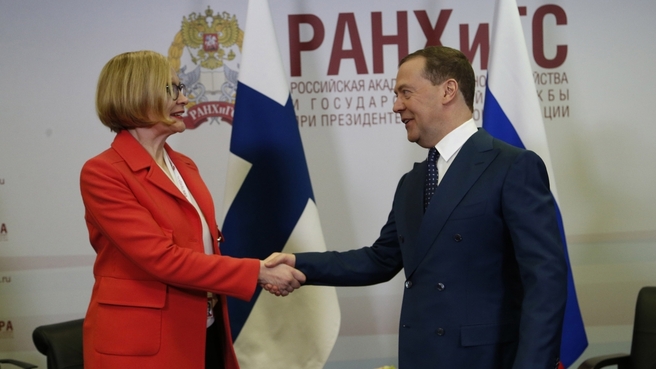The main theme of the 2019 Gaidar Forum is Russia and the World: National Development Goals and Global Trends.
At the plenary session of the Gaidar Forum
The Gaidar Forum is an ongoing discussion platform for pressing current issues. The forum has been held annually since 2010 in memory of Yegor Gaidar, a researcher, economist and ideologist of the early 1990s reforms in Russia. Forum discussions centre on Russia’s place and strategic role in the world.
Among forum moderators are high-ranking politicians and prominent experts, members of the Russian Government, representatives of regional authorities, and leading economists from Russia and around the world.
The forum’s objective is to involve leading global researchers and experts in discussions of economic and political issues; to maintain a continuous expert dialogue on key political and economic problems; to address major trends and key events of national and global economy and politics; to produce strategic proposals and recommendations on the development of the Russian economy.
The forum was organised by the Russian Presidential Academy of National Economy and Public Administration (RANEPA), the Gaidar Institute for Economic Policy and the Yegor Gaidar Foundation.
Excerpts from Dmitry Medvedev’s remarks:
The past decade has brought many challenges for both industrialised and emerging economies, for countries with different social structures and political systems, as well as for the global economy as a whole.
These challenges are unprecedented in terms of scale. They include a high level of uncertainty in nearly all sectors of society, the speed and scope of digital transformation, which offer huge opportunities and entail huge risks, as well as the need for regularly upgrading the infrastructure.
We see sweeping changes in conventional markets and the appearance of new markets. This concerns primarily the structure of the energy market and the increasing share of energy-efficient and environmentally-friendly energy sources.
Competition and protectionism are on the rise.
Increasing social inequality is feeding widespread discontent even in prosperous countries and will likely continue to grow, among other things, because of new problems in the employment market.
We see unfair distribution of benefits from the growing global economy and international trade, as well as disparity between the growing weight of the emerging economies and their involvement in determining the rules of international trade.
These challenges are not only interconnected, but they also give rise to the appearance of new challenges. For example, everything connected with smart things, digital doubles, self-driving vehicles and the use of 3D technology in construction and industry calls for novel approaches to management and the training of personnel. Free access to information calls for upgrading the protection of public safety and private life.
The regulatory authorities are encountering new problems. What should they do with the payment systems and cryptocurrencies? The past year demonstrated their extreme volatility, although it is not a reason for burying them.
Many global trends are only taking shape.
Some of them are obvious, while others are evading control and hence are difficult to assess and it is hard to even understand what they might lead to. The traditionally comfortable models we are using to forecast our life 10, 20 or 30 years ahead are rapidly becoming impractical. The world is changing too fast, making our conclusions obsolete.
Russia’s strategy for the medium term is outlined in the 7 May 2018 Presidential Executive Order, while the tactical steps are in the Key Guidelines for the Government to 2024, and in the national and federal projects that have already been launched.
Our plans include, first, ambitious but practical targets. Second, they stipulate the provision of appropriate resources and personnel. And third, they set out an approach that allows us not only to monitor the implementation of our plans but also to see what adjustments we need to make. We have created a clear structure of steps we must take towards our national development goals by using not only our traditional advantages but also by transforming global challenges into new sources of growth.
The US Federal Reserve Chairman has compared economic policy to walking through a room full of furniture when the lights go out. On the one hand, this level of uncertainty in the global and national economies is objective. It depends primarily on the speed of technological development. In fact, it is the charge for technological progress.
On the other hand, and this is the worst part, this level of uncertainty is being created deliberately. I am referring to the policy of aggressive economic and political pressure, which some countries have recently adopted. It includes illegal sanctions, the use of force at trade talks, the arrest of foreign top managers as well as an actual ban on the purchase of some companies’ products. These restrictions have been used against many countries and, consequently, against thousands of companies and banks.
This is an attempt to change the architecture of international trade to suit one’s own purposes and to use one’s position as the global emission centre so as to control the international financial system, while at the same time increasing one’s sovereign debt to the utmost. Ultimately, it is an attempt to shift a major part of one’s internal political and economic risks onto other global economic players.
Back in the second half of the 20th century, US Secretary of the Treasury John Connally said that the dollar “is our currency but your problem.” Regrettably, this position has not changed over the past 50 years. The US dollar is still dominating the market.
The country whose currency is the key reserve currency is undermining public trust in it. Paradoxically, this country also provides reasons for the de-dollarisation idea. This policy can hardly be described as acceptable.
Russia and the EU have discussed ways of protecting their economic ties with Iran from unilateral sanctions. This approach is based on the common views on the [US] withdrawal from the nuclear deal and the economic consequences of this decision. The European Commission has prepared a package of measures to expand the use of the euro in strategic industries. The reason for them has been clearly formulated as the growing political and currency risks of the dollar zone.
We are also expanding the use of the rouble and other national currencies in foreign trade. We have slashed our investment in US treasury bonds. The latest issue of Russian Eurobonds was denominated in euros. This is the result of the aggressive and often incoherent US economic policy.
These economic actions by the world’s largest economic actor are only increasing the pressure. But there are also other structural problems facing Russia and other countries.
First of all, we need to settle our infrastructure problems. For such a large and complicated country as Russia, modernising the transport, energy, information and social infrastructure is of vital importance for ensuring a balanced spatial development, improving living standards and enhancing the efficiency of our involvement in global transportation and logistics projects.
We have prepared a plan for modernising and expanding the mainstream infrastructure. We intend to invest some $100 billion in its implementation, including from extra-budgetary sources, by 2024.
It is vitally important to create a stimulating business environment. This primarily concerns control and supervision. The number of the so-called mandatory requirements concerning inspections of businesses remains unreasonably large. Many of these requirements were formulated back in the Soviet era and have become obsolete morally as well as technologically.
We must reduce the burden on our business people and revise the system of requirements, primarily in such over-regulated sectors as transportation, the environment, industrial safety, veterinary medicine, as well as sanitary and epidemiological supervision. This goal can be attained through the use of the so-called guillotine of regulations.
The old provisions on mandatory requirements that are not specifically approved or amended shall be automatically considered null and void. This mechanism should be used to review all these provisions for compliance with modern realities by 1 February 2020. The goal is to create a transparent system of supervision that will ensure consumer safety and accelerate economic growth.
The second challenge includes the industrial revolution and the development of digital technology. The digital agenda has become truly international. The development of uniform digital standards, rules, e-commerce, personal data protection and cyber threats require joint discussions as well as coordinated actions.
Like many other countries, Russia has made digitalisation a national development priority. We have good starting positions overall, if we take a look at the level of development of our country and other countries. However, there is a fairly large digital development gap by industry and by region.
Another problem is the lack of corresponding competences in the state apparatus, right down to the municipalities, sector-specific departments and the law enforcement system. We need to retrain at least a million specialists, and thus develop the corresponding programmes as quickly as possible.
The third thing is a radical transformation of the labour market and related changes in the social sphere. Many experts are even talking about a traditional employment crisis and a vast increase in unemployment among workers with low and medium skills. On the other hand, the platform-based technologies provide endless possibilities for harnessing labour and providing jobs in a variety of formats, including remote, part-time and self-employment.
In this regard, several pressing issues are common to most countries. How can one ensure that all citizens are involved in the new technological wave? How will the rights of those who, due to the technological advances will be left out of the social protection system? What will happen to the social protection system itself as these trends and social phenomena gain momentum? How should the taxation system be transformed given these circumstances? As we can see from the very complex social processes and mass protests in European countries, particularly in France, we should start looking for such answers as soon as possible.
A special tax regime for the self-employed has entered into force in Russia this year. Its main components include its voluntary nature, fairly low rates, and extremely straightforward, just elementary, registration and reporting system. It is critically important that the law guarantees the stability of these terms for 10 years. So far, this regime exists in several regions. However, if it becomes popular, it can be applied throughout the country.
Clearly, these common problems must be addressed by joint efforts, consistently and pragmatically. We must seek reasonable compromises and gradually restore lost credibility. Only mutual trust will turn our common problems into unprecedented common opportunities.
***
At the end of the plenary session, Dmitry Medvedev met with the Speaker of the Parliament of Finland, Paula Risikko.
